 This library project is part of the more general dynamics of our place of life since February 2020. We are about fifty people from all paths of life occupying these buildings belonging to the department of Val de Marne. We are squatting to meet a need to have a roof over our heads and because we refuse to give in to the blackmail of work, rent and money. In short, we squat to find a place to live and to fight.
This library project is part of the more general dynamics of our place of life since February 2020. We are about fifty people from all paths of life occupying these buildings belonging to the department of Val de Marne. We are squatting to meet a need to have a roof over our heads and because we refuse to give in to the blackmail of work, rent and money. In short, we squat to find a place to live and to fight.
Since our installation, we have developed various activities that we wish to pursue as best we can despite the pandemic and continue to develop new ones. It is for these reasons that we now present our new library. This self-managed library is, in the continuity of our place, anti-capitalist and against all forms of oppression. Just like our solidarity market, the film club, the sports hall or the various workshops, it is part of a desire for autonomy against institutions, to develop our own contents in a break with a commercial logic. Thus, in this struggle, and since, just like going to the cinema, a book costs at least 10 bucks, we wish to make available for free all the books we can get. This library is thus composed only of recuperation, donations (and theft). We see it as a participatory place for meetings and exchanges and encourage as many people as possible to take advantage of it to propose various activities such as reading circles, book presentations, sales and all other things. This library wants to be as varied as possible. It includes books ranging from theater to political theory, practical guides and novels. A feminist mobile shelf, made up of the meetings without cis men taking place at our place, will also be available during the opening days of the library. A children’s corner with games and stories is also present.
The library will now be open every other Sunday on the same day as the film club sessions, and the return of books will be possible either every Sunday during the solidarity market or through a box in front of our house. Loans will be for a period of one month, renewable for two weeks. We are counting on you to come and read, discuss, participate and meet us! [Read More]
Vitry-sur-Seine: welcome to the Kunda library!
Ile-Saint-Denis (France): The Pavillon Solidaire, solidarity with refugees
Solidarity, not just a word
What do you see when you take a walk around L’Ile Saint Denis – along the river banks, under the bridges, through the squares, the park? Everywhere desperate people hiding in tents, in flimsy constructions of plastic and wood, in the bushes, in any hole they can find. Hiding from the freezing cold, and hiding from the police with their batons, dogs and choking gas.
Over the weeks before the occupation we checked inside the Pavillon Solidaire several times, we wanted to be completely sure no one was using it. What did we find? The doors left open, rubbish piled up, mould growing everywhere, building work unfinished, foul stench of food left to rot, the garden clogged up with leaves, the building literally rotting.
These days it’s a cliché to say we’re living in scenes from a zombie movie. But that’s just what it seemed like, an abandoned house whose inhabitants have fled the apocalypse. A house that could provide a shelter from the cold and fear outside – at least for a few people, at least for a little while. [Read More]
Paris: occupation of the Place de la République, repression and manhunt
 The night of the tents: the worst happened. Horror and outrage, the statue of the Republic was petrified – Extracts from the joint press release
The night of the tents: the worst happened. Horror and outrage, the statue of the Republic was petrified – Extracts from the joint press release
The worst is not the images, it is the night that has once again swallowed the migrants outside. The worst is that the 400 migrants present, at 7pm, Place de la République, will sleep outside again tonight, far away in Clichy, far away in Saint-Denis, hidden under the bridges of the canals or elsewhere, invisible. The worst thing is that again, we will not see them fall asleep wounded in the cold.
No, the appalling thing did not happen when the police took the migrants out, at 8 pm, of the tents that the association Utopia 56 had set up on the Place de la République (20,000 euros of budget according to the association). The police began to throw away several hundred tents purchased this weekend to put them in a safe place. The abandoned bodies of the migrants, taken out by force, the light fabrics flying through the air from hand to hand in police hands, the soon-to-be-torn canvases, the tired faces of all of them… We were only there at the beginning. [Read More]
Saint-Denis: new evacuation of camp, police violence against migrants
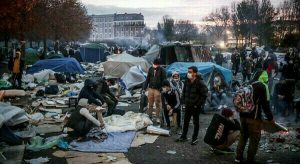 New evacuation of a migrant camp in Saint-Denis. Another communication operation on the shoulders of migrants!
New evacuation of a migrant camp in Saint-Denis. Another communication operation on the shoulders of migrants!
This morning, Tuesday November 17 at dawn, hundreds of migrants were evacuated from the camp near the Stade de France. Prefect Lallement was present on the spot and willingly answered the microphones of the media, who had obviously been warned in advance of the evacuation.
Between 65 and 70 such evacuations have taken place in recent years in the Île-de-France region. The State’s solution is to evict people without any real care. It is a policy of “burying one’s head in the sand”. When it becomes too visible they evacuate. A few days or weeks later a new camp is formed until… the next evacuation and so on. [Read More]
Paris: Le Marbré, a new space to bring our struggles to life in Montreuil
Squat Le Marbré made itself known following the visit of the cops and the property manager on September 16 2020. Many people responded to the call for support that day and the following ones, and it was too much fun. Following a collective opening of the buildings and because we want this place to be self-organized, decisions will be made in a regular open general assembly of the place. We want to fight against all forms of authority and formal or informal hierarchies, both outside and inside the place. For us this means fighting all forms of domination and oppression.
This occupation is based on a refusal: the one of having to work and struggle to pay rent in the south part of Montreuil that is constantly gentrifying, whether to live or to organize. This space is part of a struggle against the capitalist valorization of the neighborhood, which always ends up pushing the poor away to make way for the richest and their small, uneventful meadow. No meadow, no precariousness!
Le Marbré wants to be a non-market place. Reflections have been initiated on the practice: operating at a free price, favoring moments of sociability without consumerism… [Read More]
Paris: Call for support for a new squat in Montreuil
A new squatted space, Le Marbré opens in Montreuil at 1 rue Jean-Jacques Rousseau and is already threatened with eviction. The so-called owner passed by this morning together with the cops and he wants the eviction to be carried out as soon as possible. “If we evict them fast enough they won’t have time to bring back reinforcements.”
In these buildings that have been abandoned for 4 years, in addition to spaces that are inhabited, we will set up spaces for political organization for autonomous collectives that are not linked to parties, unions or associations that already have so much space to act. We want this place to be used for meetings and assemblies, workshops, spaces for sharing and free of charge (solidarity canteens and grocery stores, infoshop, library…). The idea is that any individual, informal group, or collective that fights against the State, capitalism, patriarchy, racism, psychophobia and the different forms of oppression could invest this space.
Our presence is also part of a desire to fight against the gentrification of the neighborhood. The so-called landlord practices real estate speculation and has plans to build housing that will benefit his wallet and encourage gentrification. [Read More]
Vitry-sur-Seine: Presentation of La Kunda, new autonomous social center
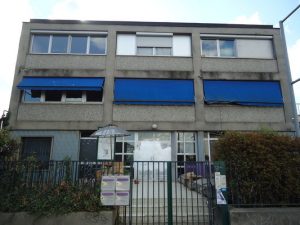 Since February 2020, we are about fifty people – precarious, undocumented, students – to occupy a plot of land with three buildings in Vitry-sur-Seine. This place, empty for less than a year, owned by the Val-de-Marne, was a home and the headquarters of a company of land shareholders in the department. We chose to call it La Kunda (the community in Soninké).
Since February 2020, we are about fifty people – precarious, undocumented, students – to occupy a plot of land with three buildings in Vitry-sur-Seine. This place, empty for less than a year, owned by the Val-de-Marne, was a home and the headquarters of a company of land shareholders in the department. We chose to call it La Kunda (the community in Soninké).
Why squatting it? The squatter responds first of all to the need, for some of us, to have decent housing and for others, quite simply, to have a home. We refuse precarious work in order to pay a rent that is too expensive, just as we refuse the blackmail of the real estate market and social institutions.
Some of us are undocumented, and follow long procedures that leave them on the street, without housing and without the possibility of working. Without the squat, it is the street, and everyone knows the difficulties of the street. Thanks to these places, some of us can go to school, move forward and have a place to live. [Read More]
Paris: families living on the streets sleep in front of the Prefecture
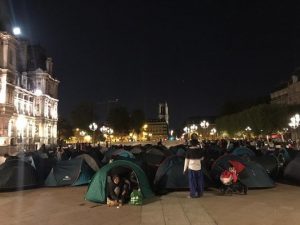 After a month of alerts to the services of the Paris City Hall and the Ile-de-France Prefecture remained unanswered, 107 exiled families living on the streets settled on Monday August 31 on the forecourt of the City Hall to put an end to this unworthy situation. The objective: to obtain permanent accommodation for all of them.
After a month of alerts to the services of the Paris City Hall and the Ile-de-France Prefecture remained unanswered, 107 exiled families living on the streets settled on Monday August 31 on the forecourt of the City Hall to put an end to this unworthy situation. The objective: to obtain permanent accommodation for all of them.
Since 2015, the public authorities have shown their inability to provide a dignified welcome for exiled people arriving in Paris, in defiance of their legal obligations. Among these people are many families and single women whose time spent on the streets is constantly increasing before they are offered care.
Every evening since 2017, the association Utopia 56 has been trying as best it can to make up for these state and municipal shortcomings via a network of solidarity-based shelters. This network is made up of about 250 people living in the Ile-de-France region who take in single women, families and couples living on the streets. [Read More]
Paris: about 300 people live under the A1 highway bridge
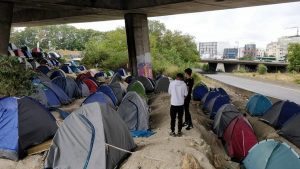 “Every morning, the police tell us to get out”.
“Every morning, the police tell us to get out”.
Barely a month after the expulsion from the Aubervilliers camp, about 300 people live in a camp set up in Saint-Denis, under the A1 highway bridge. Far from food and clothing distributions, they also suffer from police harassment.
There is anger this Friday morning in the voices and faces of the men who have been living in the camp that has been set up for a little less than a month in Saint-Denis, under the A1 highway bridge.
As every morning, the police came by at about 6 a.m. and ordered the people installed on the esplanade that stretches out in front of the tricolor letters “UEFA Euro 2016” to “get out”.
Only the tents installed on the dirt slope between the road and the esplanade are allowed to stay. The camp is contained in the most invisible and most dangerous part of this place in any point uninhabitable. [Read More]
Paris: rue du Croissant, re-housing of all occupants within one year
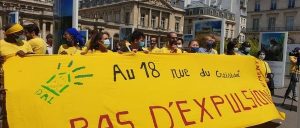 The eviction will not take place! Residents will leave the building on Thursday, August 27 from 8:30 am: They will be re-housed in HLM by the City and the Prefecture and accommodated until then.
The eviction will not take place! Residents will leave the building on Thursday, August 27 from 8:30 am: They will be re-housed in HLM by the City and the Prefecture and accommodated until then.
The 31 homeless households/families who have been occupying 18 rue du Croissant Paris 2e since January 1st 2020, have won their case: a commitment to rehouse all the occupants within a year by the Prefecture and the City of Paris was agreed at the beginning of the week, with DAL and the occupants.
A particularly severe judgment, handed down on July 2nd, ordering the immediate eviction of the occupants, as well as the involvement of the Prefecture of Police in the procedure (it was the former police station of the 2nd arrondissement) raised the imminent risk of eviction.
This is why the occupants and DAL had proposed as early as July 10 to leave the building as soon as possible on the condition that they would be housed until they were re-housed, organized anti-eviction pickets every morning to give the alarm in case, and throughout the summer, called the new government and the regional prefecture. The city of Paris had agreed to house some of the occupants. [Read More]
Saint-Denis: Two weeks after the eviction from Aubervilliers camp, hundreds of migrants return home
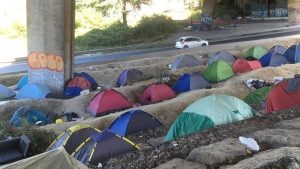 Between 300 and 400 migrants live under the bridge of the A1 motorway in Saint-Denis in totally undignified conditions, only fifteen days after the eviction from the Aubervilliers camp. The associations denounce an absurd situation where evictions and resettlements follow one another without any lasting solution.
Between 300 and 400 migrants live under the bridge of the A1 motorway in Saint-Denis in totally undignified conditions, only fifteen days after the eviction from the Aubervilliers camp. The associations denounce an absurd situation where evictions and resettlements follow one another without any lasting solution.
At the time of the eviction from the Aubervilliers camp on 29 July, Pierre Henry, the director general of France Terre d’Asile, had said to himself “See you in September”, certain that the camp would be re-formed in a few weeks.
We didn’t have to wait that long. Less than a fortnight after the eviction of the 1,500 or so people living in the camp, “between 300 and 400” people found refuge under the A1 motorway bridge at Saint-Denis. They are single men, mostly from Afghanistan.
Among them, some “missed the eviction of Aubervilliers, others had an administrative appointment that day and could not be present”, says Maël, a member of the association Utopia 56 who did not want his surname to be made public. Among these hundreds of exiles, there are also newcomers who only found this unhealthy place to settle. [Read More]
Paris: eviction of the young migrants camp set up in Jules Ferry Square
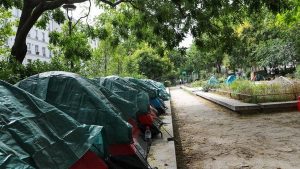 The camp, which housed more than 70 young people considered by several associations as foreign minors, in the Jules Ferry square in the centre of Paris, was evicted Tuesday morning. The young people were directed to a gymnasium and hotels.
The camp, which housed more than 70 young people considered by several associations as foreign minors, in the Jules Ferry square in the centre of Paris, was evicted Tuesday morning. The young people were directed to a gymnasium and hotels.
After more than a month camping in the Square Jules Ferry in central Paris, some 70 young migrants who claim to be minors were evicted on Tuesday 4 August.
The eviction, which was carried out peacefully, ended at around 8:30 a.m. With masks on their faces, the young people were accompanied on buses by agents of the Ile-de-France prefecture and the Paris City Hall, under the watchful eye of a few police officers standing back. An eviction order had been posted by the police on Sunday evening in the camp.
Forty-eight young people were taken to the Japy gymnasium in the 11th arrondissement. Thirty others, more vulnerable due to medical conditions – including seven young girls – were housed in social hotels.
Evaluated as adults by several departments, the young men present in the camp are currently awaiting their appeal against this evaluation. In the meantime, no accommodation arrangements are planned for them. [Read More]
